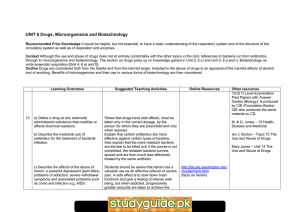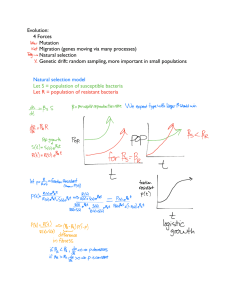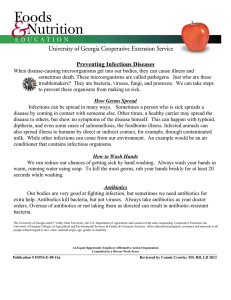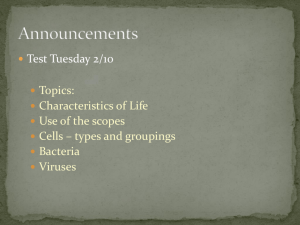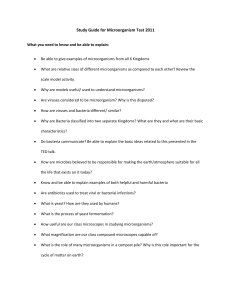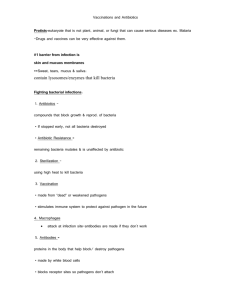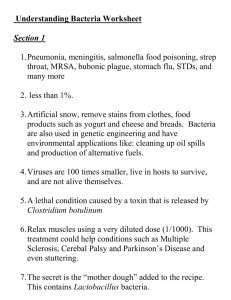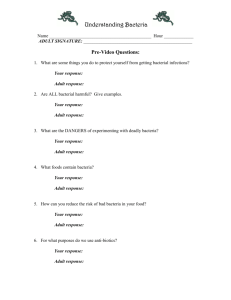O Level Biology (5090) Unit 6: Microorganisms and Biotechnology www.XtremePapers.com
advertisement
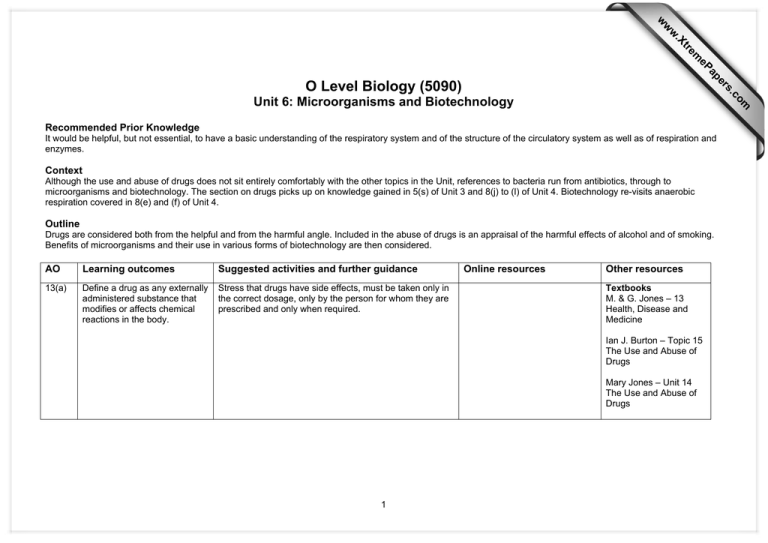
s er ap eP m e tr .X w w w om .c O Level Biology (5090) Unit 6: Microorganisms and Biotechnology Recommended Prior Knowledge It would be helpful, but not essential, to have a basic understanding of the respiratory system and of the structure of the circulatory system as well as of respiration and enzymes. Context Although the use and abuse of drugs does not sit entirely comfortably with the other topics in the Unit, references to bacteria run from antibiotics, through to microorganisms and biotechnology. The section on drugs picks up on knowledge gained in 5(s) of Unit 3 and 8(j) to (l) of Unit 4. Biotechnology re-visits anaerobic respiration covered in 8(e) and (f) of Unit 4. Outline Drugs are considered both from the helpful and from the harmful angle. Included in the abuse of drugs is an appraisal of the harmful effects of alcohol and of smoking. Benefits of microorganisms and their use in various forms of biotechnology are then considered. AO Learning outcomes Suggested activities and further guidance 13(a) Define a drug as any externally administered substance that modifies or affects chemical reactions in the body. Stress that drugs have side effects, must be taken only in the correct dosage, only by the person for whom they are prescribed and only when required. Online resources Other resources Textbooks M. & G. Jones – 13 Health, Disease and Medicine Ian J. Burton – Topic 15 The Use and Abuse of Drugs Mary Jones – Unit 14 The Use and Abuse of Drugs 1 13(b) Describe the medicinal use of antibiotics for the treatment of bacterial infection. Explain that certain antibiotics are more effective against certain types of bacteria. Also explain that the more resistant bacteria are the last to be killed and if the course is not completed, the resistant bacteria survive, spread and are then much less effectively treated by the same antibiotic. Students may watch the suggested video clip and write a commentary to help them to understand issues surrounding the development of antibiotic resistant bacteria. 13(c) Describe the effects of the abuse of heroin: a powerful depressant, problems of addiction, severe withdrawal symptoms and associated problems such as crime and infection e.g. AIDS. Students should be aware that heroin has a valuable use as an effective reliever of severe pain. A side effect is to slow down brain functions and give a feeling of intense well-being, but when addicted, progressively greater amounts are taken to achieve the same level of euphoria. Withdrawal symptoms are most unpleasant. Crime is used to fund the habit. If heroin is injected with used needles, diseases such as AIDS may be spread. Students may research the biological and social effects of heroin using the suggested online resources and produce a ‘spider diagram’ to summarise the findings of their research. 13(d) Describe the effects of excessive consumption of alcohol: reduced self- control, depressant, effect on reaction times, damage to liver and social implications. Note that excessive alcohol consumption is being considered. Social implications include being a danger to others (e.g. slowed reaction times when driving) as well as crime committed both when under the influence and to fund the habit. Liver damage results from excessive longterm alcohol use – cross reference with 5(s) in unit 3. Students may produce a two column table listing the biological and social effects of excessive alcohol consumption. 2 Antibiotics: http://hcd2.bupa.co.uk/fact_shee ts/html/antibiotics.html Antibiotic resistance video clip: http://www.sumanasinc.com/scie nceinfocus/antibiotics/antibiotics _fla.html Antibiotic resistance information: https://www.bbc.co.uk/schools/g csebitesize/science/21c/disease/ antibioticsdrugtestingrev2.shtml Heroin facts: http://faculty.washington.edu/ch udler/hero.html http://www.talktofrank.com/drugs .aspx?id=186 http://www.bbc.co.uk/health/emo tional_health/addictions/heroin.s html Alcohol addiction: http://www.bbc.co.uk/health/emo tional_health/addictions/typesad diction_alcohol.shtml Alcohol addiction including links to other useful sites: http://www.nhs.uk/livewell/addiction/alcohol-addiction 13(e) 13(f) Describe the effects of tobacco smoke and its major toxic components (nicotine, tar and carbon monoxide) on health: strong association with bronchitis, emphysema, lung cancer and heart disease, and the association between smoking during pregnancy and reduced birth weight of the baby. Recognise the fact that many people regard smoking as no longer socially acceptable. Apart from a description of the listed effects, students should be referred to their knowledge of lung structure from Unit 4, 8(j). (k) and (l) for an explanation of tar coating the walls of the alveoli, for the destruction of cilia and the consequent build-up of mucus, and for the effect of emphysema. Tar, nicotine and CO: http://www.no-morecigarettes.com/articles/tarnicotine-and-carbon/index.php Using a filter pump to draw smoke from a lighted cigarette through a cotton-wool filter provides a graphic and effective demonstration of the tar deposit from one cigarette. Addition of universal indicator shows production of an acidic gas. Smoking machine demo: http://www.practicalbiology.org/a reas/intermediate/health-anddisease/health-choices/whats-incigarette-smoke,67,EXP.html Refer to research on the link between lung cancer and ‘passive’ smoking, as well as to the effect on the eyes and clothes of those in the presence of a smoker. Passive smoking article: http://www.timesonline.co.uk/tol/l ife_and_style/health/child_health /article7073204.ece Smoking and pregnancy: http://www.bupa.co.uk/health_inf ormation/html/healthy_living/lifes tyle/smoking/smoking_pregnanc y.html Students may research and discuss recent changes in the law in some countries to restrict smoking in public places. Use the suggested online resource to discuss whether the scope of these laws should be extended further. 14(a) List the main characteristics of the following groups: viruses, bacteria and fungi. Present students with labelled diagrams of the external features of each type of organism. Students may use the suggested online resource to produce a supporting table comparing these organisms. Information and diagrams: http://www.peteducation.com/arti cle.cfm?c=1&aid=2956 Textbooks Ian J. Burton – Topic 16 The Diversity of Organisms Mary Jones – Unit 15 Micro-organisms and Biotechnology M. & G. Jones – 14 Making Use of Microorganisms 3 14(b) Outline the role of microorganisms in decomposition. Explain that the ions, originally absorbed by plants, (cross reference 4 (j) in Unit 2), are released again when bacteria decompose dead plants and animals in a reverse of the process which attached them to organic molecules within the plant. Microorganisms release enough energy (as heat) as they respire during this process that compost/manure heaps steam, smoke and may even catch fire. Use the stimulus photo showing a steaming compost heap and/or a video of fruit decaying. Students should discuss and write a description of the processes occurring. Produce a table or spider diagram’ listing how a range of factors affect the rate of decomposition. 14(c) Explain the role of yeast in the production of bread and alcohol. In 8(e) and (f) of Unit 4 students learnt that a form of anaerobic respiration (fermentation) turns sugar into alcohol and CO2. Explain that the CO2 is used in bread making to make the dough rise and the CO2 provides sparkle to alcoholic drinks in which fruit or other plant sugars are used as the substrate. Yeast provides a collection of enzymes during anaerobic respiration to catalyse this process. Compost heap stimulus photo: http://hotdogjam.files.wordpress. com/2008/11/compost_heap.jpg Time-lapse decay video: http://www.bbc.co.uk/schools/gc sebitesize/design/foodtech/acido xitemprev2.shtml Factors affecting decomposition: http://www.bbc.co.uk/schools/gc sebitesize/science/add_gateway /greenworld/decayrev1.shtml Bread making: http://www.aboutscotland.co.uk/ cuisine/index.html Students may use yeast in a glucose solution to; i) demonstrate the anaerobic evolution of CO2. The rate may be measured at different temperatures using a water bath and counting the number of bubbles released from a narrow delivery tube in unit time, and ii) make a dough with flour placed in a measuring cylinder. The rate of CO2 release can be measured as the dough rises up the cylinder. Different temperatures could be investigated. Measurements could be recorded and graphs of the rate of respiration (distance risen in unit time) against temperature could be drawn. 4 Demo CO2 production by yeast: http://image.tutorvista.com/conte nt/respiration/alcoholicfermentation-demonstration.jpeg Time-lapse dough rising video: http://www.youtube.com/watch? v=Sgr9gery9dY 14(d) Outline the role of bacteria in yoghurt and cheese production. The production of lactic acid is now relevant as the agent which sours the milk. Students may read and discuss the suggested online resource and produce a written summary of; Lactic acid producing bacteria: http://www.eufic.org/article/en/pa ge/FTARCHIVE/artid/lactic-acidbacteria/ i. how bacteria are used to produce yoghurt from milk, and ii. how production of yoghurt allows milk to be preserved. 14(e) Describe the use of fermenters for large-scale production of antibiotics and single cell protein. Students may watch the video of cheese production and produce a flow chart to summarise and explain each of the steps in the production process. Cheese production video: http://www.foodafactoflife.org.uk/ VideoActivity.aspx?contentId=16 3&sectionId=63&siteId=14&titleI d=171 Provide students with a copy of a labelled diagram of an industrial fermenter to which they may add annotations to explain the significance of each feature labelled. Fermenter diagram: http://www.biotopics.co.uk/micro bes/penici.html The general principles of controlling amount of substrate and temperature, sterilisation of utensils, production of large yields in a small space and purification of product should be covered. Even though the substrates are often waste products from other industries (e.g. molasses from sugar refining), expense can often be a disadvantage. 14(f) Describe the role of the fungus Penicillium in the production of penicillin. Students may watch the video summarising the discovery of penicillin and outline how the methods used in penicillin’s early production are in contrast to the large commercial production of the drug today. 5 Discovery of penicillin video: http://videos.howstuffworks.com/ science-channel/29783-100greatest-discoveries-penicillinvideo.htm
